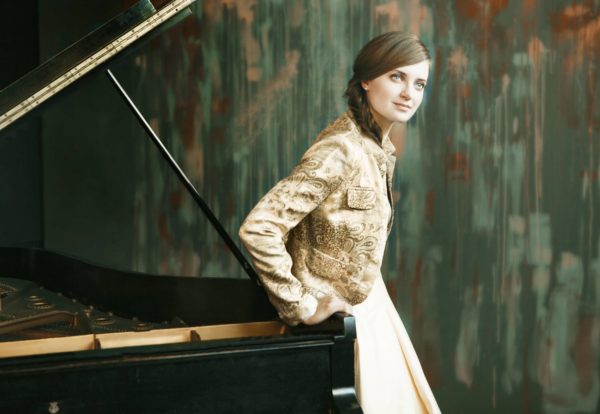Classical CD Reviews: Stanford’s Mass “Via victrix”, Pablo Heras-Casado conducts Mendelssohn, and Anna Shelest plays Rubinstein
By Jonathan Blumhofer
Charles Villiers Stanford’s bold Mass Via victrix is finally heard; Pablo Heras-Casado wraps up his survey of the Mendelssohn symphonies in high style; Anna Shelest completes her performances of Anton Rubinstein piano concertos.

Charles Villiers Stanford’s star was diminishing over the last years of his life, though his output remained ambitious, as the BBC National Chorus and Orchestra of Wales’ new recording of his Mass Via victrix makes clear.
Written to commemorate the end of World War 1, Via victrix wasn’t performed in full until 2018. Stanford, himself, conducted the “Gloria” at Cambridge University in 1920; otherwise, the score lay neglected for nearly a century. That’s a sad fate for so bold a piece.
Indeed, Stanford’s Via victrix was conceived as a kind of national memorial to the war, something along the lines, perhaps, of Beethoven’s Missa solemnis. Whether it lives up to that comparison is another matter, but, at its best moments, it’s a touching, deeply thought-through score, one that deserves much more than a once-a-century airing.
In the present recording (a live taping of the complete work’s premiere), the BBC National Chorus of Wales sings with robust enthusiasm and spirit. Yes, there are some tonally rough spots in the “Kyrie,” and rhythms there and in the opening part of the “Gloria” are occasionally blurry. But, on the whole, theirs is an entirely satisfying reading.
The warm progressions that unfold once the “Kyrie” gets going are beautifully done and the “Cum sancto spiritu” fugue bristles with energy. Stanford’s acerbic harmonies in the “Crucifixus” of the “Credo” come across with winning intensity, as do the delicate textures of the “Sanctus.”
A strong cast of soloists – soprano Kiandra Howarth, alto Jess Dandy, tenor Ruairi Bowen, and baritone Gareth Brynmor John – acquit themselves admirably. Howarth, in particular, imbues her solos in the “Kyrie” and “Agnus Dei” with pliancy and warmth.
Adrian Partington leads the combined forces with a kind of missionary zeal. He has a good sense of tempo and pacing, not losing sight of the work’s big picture. It’s an unfamiliar piece, to be sure, and, accordingly, some tentativeness is present in the performance.
But Via victrix’s grand scope comes across with clarity. Its most striking episodes – the stately melismas of the “Kyrie,” the noble writing in the “Sanctus” and contrapuntal textures in the “Benedictus,” the pungent dissonances in the “Agnus Dei” – speak powerfully. Even if it’s, fundamentally, a conservative work, this is music deserves to be heard.
So, at least occasionally, is At the Abbey Gate, Stanford’s 1920 setting of Charles Darling’s eponymous unknown-soldier poem that fills out the disc. Written to mark the dedication of the Cenotaph that year, it’s cut from the same stylistic cloth as Stanford’s Songs of the Fleet, with choral and solo baritone episodes alternating between a pair of grand orchestral statements.
The performance here, again the work’s premiere recording, features baritone John taking the solo part. It’s steeped in grandeur: a sincere, heartfelt account of a sincere, heartfelt piece, earnest but not cloying.

After five years, Pablo Heras-Casado wraps up his survey of the Mendelssohn symphonies for Harmonia mundi. The ultimate installment pairs him again with the Freiburger Barockorchester, as responsive and crackerjack a period ensemble as they come.
The orchestra’s playing in Mendelssohn’s Symphony no. 1 is, accordingly, marvelously tactile: full of propulsive attacks, transparent gestures, and episodes of furious turbulence. In the opening movement, tempos are swift, dynamic swells are exaggerated, and the music’s aggressive moments stirringly realized. A similar approach defines the brash, outer sections of the third-movement minuet and the finale.
When the music quiets down in the second movement and the minuet’s trio, the Freiburgers respond with playing of lightness and color – conspicuously mysterious-sounding ones, to be sure, in the latter.
Taut rhythmic execution and driving intensity also mark the Freiburger’s account of their role in Mendelssohn’s Piano Concerto no. 2, the Symphony’s counterweight.
The soloist here is Kristian Bezuidenhout. He plays his part with a lightness of touch that befits Mendelssohn’s style – the Second Concerto’s filled with lots of glittering passagework – but Bezuidenhout’s reading is also tonally weighted and shaped with care.
The result, is an altogether lovely, probing account of a Mendelssohn’s most easily-overlooked mature concerto. Its first movement brims with passion, while the second sings like an extended, orchestral Song Without Words. The finale is a lively blast.
Rounding out the album is an elegantly driving account of the Overture to Die schöne Melusine. It’s a strong, balanced finale to, perhaps, the finest entry in this series.

Pianist Anna Shelest — a clear affinity for Anton Rubinstein’s wildly virtuosic writing,
Anna Shelest’s survey of the complete Anton Rubinstein piano concertos continues apace with her new account of the Russian composer’s Third and Fifth keyboard concerti.
Highly regarded in his lifetime, Rubinstein’s output has faded in popularity since his death in 1894. Based on the excesses of these two scores, it’s not hard to see why. Some fetching ideas notwithstanding, both works are, ultimately, shallow and derivative.
The Third, with its echoes of Chopin in certain of the slow movement’s gestures and the finale’s rousing polonaise-finale, comes off the best. Still, the first movement’s choppy phrases, lack of developmental polish, and trite coda do little to balance things off.
Clocking in at more than forty minutes, the Fifth magnifies the former’s problems while also managing to overstay its welcome and treat the orchestra as an afterthought. True, it makes breathtaking technical demands of the soloist – but without much payoff (expressive, melodic, dramatic, whatnot) involved.
At least in these performances, you can’t fault Shelest or the Estonian National Symphony Orchestra (ENSO) their avidity.
Shelest has a clear affinity for Rubinstein’s wildly virtuosic writing, playing both pieces with terrific rhythmic command, bold colors, and a strong sense of shape. In the Third, she phrases the central movement’s Adagio sections with the utmost delicacy, while the outer movements’ blistering passagework glistens.
Similar brilliance and attention to detail mark her reading of the Fifth, with its anticipations of Rachmaninoff (an admirer or Rubinstein’s) and echoes of Tchaikovsky (one of his many students). Shelest’s articulation of the first movement’s busy octave-episodes are beautifully balanced and her introduction of the finale’s swashbuckling tarantella theme lacks nothing for flair. The stately middle movement proves winningly poetic.
For their part, the ENSO and conductor Neeme Järvi match Shelest for brio. Their account of the Third Concerto’s accompaniment is shapely and warm. In the Fifth, Rubinstein’s disjunct phrases and patchy treatment of the orchestra results in some ragged entries but the larger character of the music, such as it is, comes across well enough.
Jonathan Blumhofer is a composer and violist who has been active in the greater Boston area since 2004. His music has received numerous awards and been performed by various ensembles, including the American Composers Orchestra, Kiev Philharmonic, Camerata Chicago, Xanthos Ensemble, and Juventas New Music Group. Since receiving his doctorate from Boston University in 2010, Jon has taught at Clark University, Worcester Polytechnic Institute, and online for the University of Phoenix, in addition to writing music criticism for the Worcester Telegram & Gazette.
